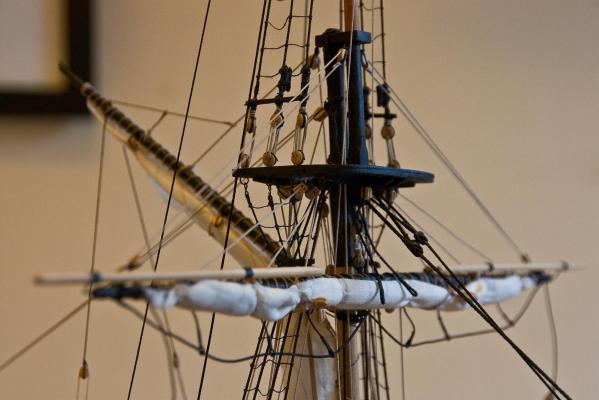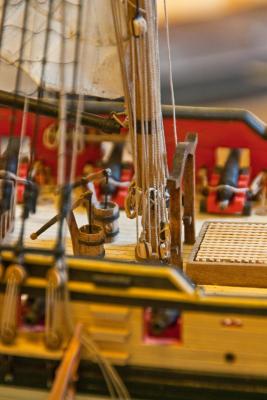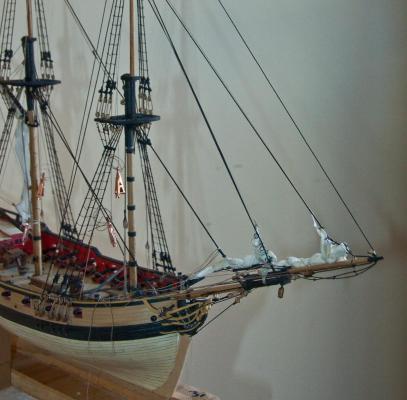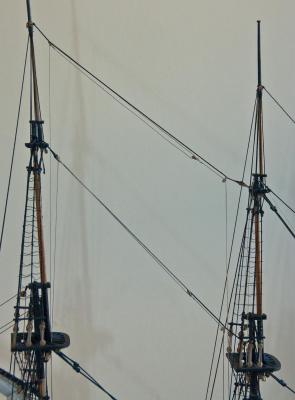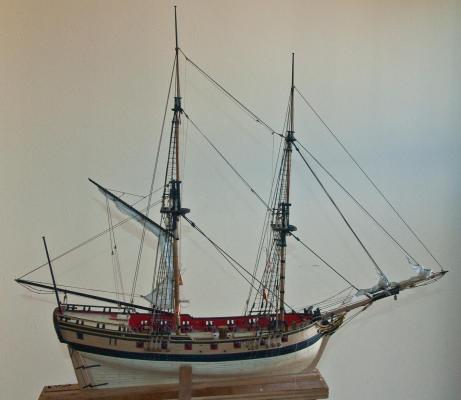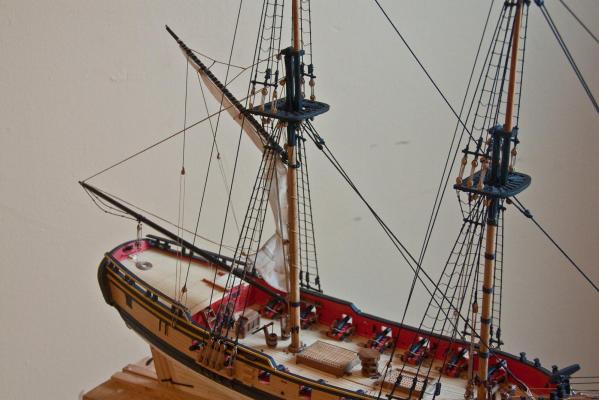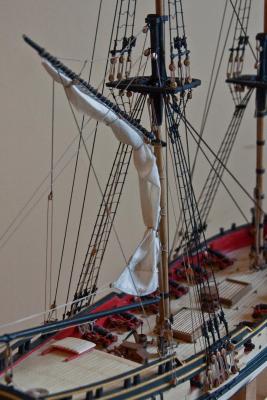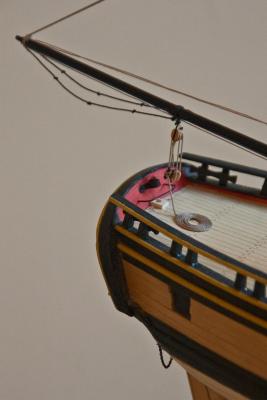-
Posts
1,232 -
Joined
-
Last visited
Content Type
Profiles
Forums
Gallery
Events
Everything posted by KenW
-
I'm still not going to rig the tackles. Because I am installing bunt lines and leech lines, I don't have any empty belaying pins. I guess my captain has the tackles stowed below. Cheers.
- 455 replies
-
- fair american
- model shipways
-
(and 1 more)
Tagged with:
-
After a Thanksgiving that couldn’t be beat, it’s back to the shipyard. The main lower yard was installed and most of the rigging tied off. Since the lines that attach to the main mast cleats are now in place, the main gallows are installed and the staysail halyards are tied off. The brace pendants are attached but I will not be showing the tackles as the FA plans don’t have places to tie them off to. As per the Syren documentation, the buntlines/leech lines are not glued in place, just wrapped around their shroud cleats. Cheers
- 455 replies
-
- fair american
- model shipways
-
(and 1 more)
Tagged with:
-
I think it looks great. The inside is natural wood and the outside looks fine painted. You should have no regrets. And your outstanding workmanship is evident. Cheers.
- 1,477 replies
-
- essex
- model shipways
-
(and 1 more)
Tagged with:
-
Thanks for your kind words. Actually I was thinking that some day I might like to build the Confederacy. I may want to add masts and rigging though.
- 2,191 replies
-
- confederacy
- Model Shipways
-
(and 1 more)
Tagged with:
-
Sometimes a 'like' is not enough; this is one of those times. I've been very impressed with your build. And, the first gun looks great. Your work is definitely a goal for my next set of guns and, for that matter, for my next entire build. Fantastic work. Cheers.
- 2,191 replies
-
- confederacy
- Model Shipways
-
(and 1 more)
Tagged with:
-
Great work on the boom rest. Luckily you hadn't already installed the mast. Keep up the good work. Cheers.
- 974 replies
-
- rattlesnake
- mamoli
-
(and 1 more)
Tagged with:
-
The next sails to be installed are the jib and the fore topmast staysail. I used Antscherl to determine the actual size of the sails and then trimmed them down keeping their triangle shape. However, I didn’t reduce the foot of either sail. Each foot is somewhat long, and I wanted that to show. I also decided to install the rigging for the main topmast staysail and the main topgallant staysail. I noticed that the lines are tied off to the gallows so there won't be a problem. The metal clips you see are for their downhauls and halyards since I won’t install the gallows until all the lines are attached to the lower mast cleats. Both main staysail's rigging was done as per the Syren documentation.
- 455 replies
-
- fair american
- model shipways
-
(and 1 more)
Tagged with:
-
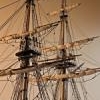
Landlubber Mike's technique for furled sails
KenW replied to Landlubber Mike's topic in Masting, rigging and sails
I just did some research - in Lees on page 123, he shows how staysails were furled. Either the brails served as the downhauler or the downhaul line served as the brail. The sail was pulled forward down to the mast and then gaskets were used. Most drawings I have seen do not show staysails, so I still believe they spent most of their time stowed below. Cheers, -
Hey Peter: Your spanker looks great. I used Lees' page 113 and the description of spanker rigging on page 114. The brailing method I decided on was probably not used until after 1818, so my method is not historically correct. I added two single brailing blocks and one double on the gaff and one single block seized to a cringle on the sail. All four lines ended up on the same mast cleat. Cheers.
- 431 replies
-
- pegasus
- victory models
-
(and 1 more)
Tagged with:
-

Landlubber Mike's technique for furled sails
KenW replied to Landlubber Mike's topic in Masting, rigging and sails
Shawn and Mike: It is my understanding that except for the forward staysails, which were more like jibs, the staysails were not furled, but taken down and stowed. Interesting to hear other opinions. Cheers. -
Thanks for the reply. And congrats on your new found freedom. (Still have to answer to the Admiral, of course.) I like your shape for the spanker. Did you have any problems with the brailing? I had a hard time where the gaff meets the boom. Do you have a photo of your final result? Cheers.
- 431 replies
-
- pegasus
- victory models
-
(and 1 more)
Tagged with:
-

Landlubber Mike's technique for furled sails
KenW replied to Landlubber Mike's topic in Masting, rigging and sails
Thanks for replying. Handkerchief material and women's summer blouses seem to be the favorites. But you need to feel the fabric. This weekend I found an old curtain that looks to be prefect. It was washed a lot and it "hung around" for many years. I guess you can't beat old age. As to the flag, I've seen old pictures of ships in harbor with the flag flown from a pole and from the end of the gaff. I suspect it was the captain's choice. Thanks again. -

Landlubber Mike's technique for furled sails
KenW replied to Landlubber Mike's topic in Masting, rigging and sails
Do you have the number of the "thinnest weight cotton (muslin I think) that I could find at JoAnn's Fabrics"? I don't have a store nearby, and I can't see and feel the fabric before I buy on the JoAnn" website. Thanks. -
Natural - the blue on the transom and stern is too much. Just my two cents.
- 1,051 replies
-
- cheerful
- Syren Ship Model Company
-
(and 1 more)
Tagged with:
-
Thanks Ed, Bob, Alistair and gerty. Also thanks for all the 'likes'. Following the Syren doc., my next move is for the Jib and Fore Topsail Stay. I won't be doing the other stay sails due to the lack of belaying points. Cheers.
- 455 replies
-
- fair american
- model shipways
-
(and 1 more)
Tagged with:
-
The gaff, boom and spanker sail are finally done. This sail was the hardest for me to furl. The problem was with the ‘bend’ at the angle formed where the gaff meets the mast. Also, the weight of the sail cloth didn’t help. I finally managed to get something that looks O.K. I used brail lines and their block pairs. Have to thank the Lees, Antscherl and Peterseen books for their explanations and illustrations for guidance. All are now mounted on the ship. But I definitely need a better sail cloth if I’m going to add sails to my next build. I have ordered cloth from various sites and the Amati cloth is the best of them, but I need better.
- 455 replies
-
- fair american
- model shipways
-
(and 1 more)
Tagged with:
-
Have you cut your reduced version of the spanker sail yet? I'm interested in its shape and any other tips you might have. Thanks.
- 431 replies
-
- pegasus
- victory models
-
(and 1 more)
Tagged with:
-
Great discussion on painting cannon barrels. I will bookmark these pages to refer back to on my next model. When you say you degrease in alcohol, I assume you mean rubbing alcohol. And what do you do to the barrels between coats of paint? Sand? Use steel wool? Also, do you water down the MS paint? Thanks.
- 2,191 replies
-
- confederacy
- Model Shipways
-
(and 1 more)
Tagged with:
-
Wow - Let's see if I can answer all of that. I looked at several sources, including the Syren doc., and decided there were no stund'l booms on the upper most mast. So for the FA, it is only lower and topsail yards. I didn't use brass tubing - I used black paper for the irons and the SBs are actually held to the mast by the two wires (they are 28 gauge). The topsail SBs are from cocktail toothpicks and the lower ones are 1/8 bamboo skewers (made thinner a bit). They are placed, not above the yards, but at a 45 degree angle forward. When I attach the yards, I will follow the order in the Syren documentation. I still have to make the gaff. I plan on using pins; but not until all the blocks, lines and sails are attached. I want anything that can possibly be done off the model to be done first. I do have parrel beads for the yards (but not for the sprit sail yard or the boom). The parrel setup is as shown in the plans. Hope this helps. Keep in mind that some of my decisions are based on what I think is correct. Cheers.
- 455 replies
-
- fair american
- model shipways
-
(and 1 more)
Tagged with:
-
Never heard of Gesso. Is it easy to use? How do you apply it? Thanks.
- 1,051 replies
-
- cheerful
- Syren Ship Model Company
-
(and 1 more)
Tagged with:
-

Landlubber Mike's technique for furled sails
KenW replied to Landlubber Mike's topic in Masting, rigging and sails
I have been following, and enjoying, this thread. I'm in the process of adding furled sails on my Fair American and your 'lectures' are invaluable. One comment, a guy in my modeling club, who has navel experience, said that the flag pole on the stern that would indeed interfere with the boom was only raised when the boat was in harbor. Once under way, the flag pole and flag was stowed. I believe the flag was hoisted up to the end of the gaff. -
Hey Ed: Just encountered something that I wish I'd added earlier with the lower mast's standing rigging. I should have attached the sling bridle (Fig. 39 on page 34 in the FA instruction manual) before all the other masts and their rigging was done. Would have made things a lot better. In fact, the tightness has made me consider hanging the bridle from the cap as is shown in Peterseen's book on page 34. Seems like it will provide much more space to work in. Just a "heads up".
- 42 replies
-
- fair american
- model shipways
-
(and 1 more)
Tagged with:
-
I agree with Bob, it looks good. Don't worry, I think we have all realized that there were some 'things' we should have attached earlier. We'll do better on our next build. Cheers.
- 42 replies
-
- fair american
- model shipways
-
(and 1 more)
Tagged with:
About us
Modelshipworld - Advancing Ship Modeling through Research
SSL Secured
Your security is important for us so this Website is SSL-Secured
NRG Mailing Address
Nautical Research Guild
237 South Lincoln Street
Westmont IL, 60559-1917
Model Ship World ® and the MSW logo are Registered Trademarks, and belong to the Nautical Research Guild (United States Patent and Trademark Office: No. 6,929,264 & No. 6,929,274, registered Dec. 20, 2022)
Helpful Links
About the NRG
If you enjoy building ship models that are historically accurate as well as beautiful, then The Nautical Research Guild (NRG) is just right for you.
The Guild is a non-profit educational organization whose mission is to “Advance Ship Modeling Through Research”. We provide support to our members in their efforts to raise the quality of their model ships.
The Nautical Research Guild has published our world-renowned quarterly magazine, The Nautical Research Journal, since 1955. The pages of the Journal are full of articles by accomplished ship modelers who show you how they create those exquisite details on their models, and by maritime historians who show you the correct details to build. The Journal is available in both print and digital editions. Go to the NRG web site (www.thenrg.org) to download a complimentary digital copy of the Journal. The NRG also publishes plan sets, books and compilations of back issues of the Journal and the former Ships in Scale and Model Ship Builder magazines.


